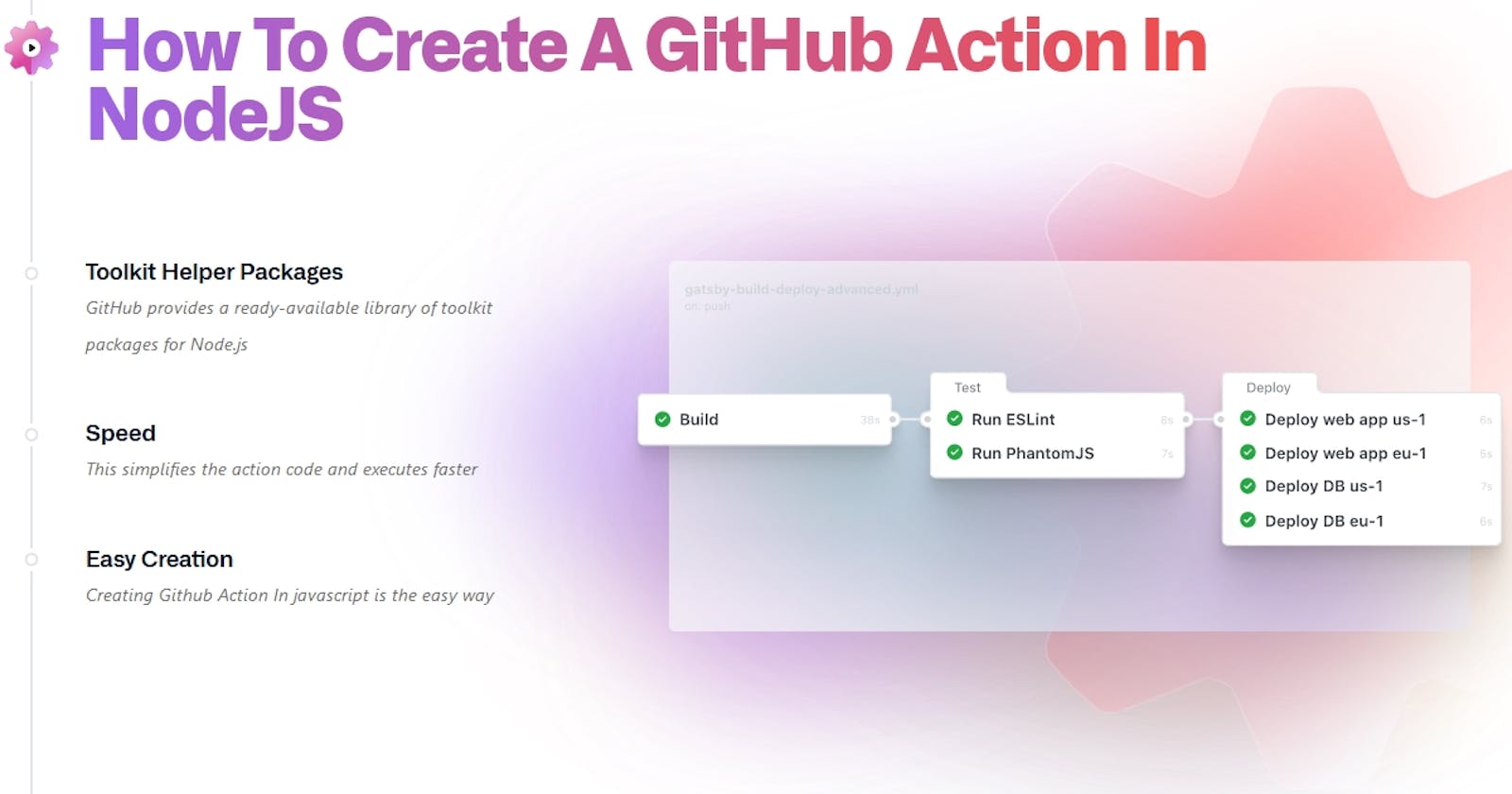This guide uses the GitHub Actions Toolkit Nodejs module to speed up development. For more information, see the actions/toolkit repository.
To ensure your JavaScript actions are compatible with all GitHub-hosted runners (
Ubuntu,Windows, &macOS), the packaged JavaScript code should be in pure JavaScript and not rely on other binaries. If it does rely on binaries, you should pack them alongside the code.
Toolkit Helper Packages
GitHub provides a ready-available library of toolkit packages for Node.js which can be used to build the JavaScript actions. We will look at some of them briefly as below:
✔️ @actions/core
This package provides a set of functions for handling inputs, outputs, results, logging, secrets and variables. Run npm install @actions/core to install this package.
🏃 @actions/exec
This package provides a function to execute commands in shell. Run npm install @actions/exec to install this package.
🍨 @actions/glob
This package provides a function to search for files matching glob patterns. Run npm install @actions/glob to install this package.
✏️ @actions/io
This package provides a function to handle disk i/o functions like cp, mv, rmRF, find etc.. Run npm install @actions/io to install this package.
@actions/github
This package provides a set of functions to interact with Github’s REST API. Run npm install @actions/github to install this package.
Please note that Github does not check or install any dependencies. The action code you create must be full packaged containing all dependencies within.
To package your Github action, please install the vercel/ncc NPM package, which is a simple CLI for compiling a Node.js module into a single file, together with all its dependencies, gcc-style.
After installing the vercel/ncc package, you must include a
preparestatement in your package.json, which ensures that the compiler runs automatically each time you update the dependencies. Make sure to runnpm run preparebefore pushing to the repository each time.
"scripts": {
"prepare": "ncc build ./src/index.js -o dist --source-map --license licenses.txt"
},
Prerequisites
- Download and install Node.js 12.x or newer, which includes npm
- Create a new repository on GitHub. For the purposes of this blog, we will be working with a repository titled
simple-nodejs-action - Clone the above repository to your local computer
- Once cloned, using terminal, change directory to the repository as below:
cd simple-nodejs-action - From your terminal, initialize the directory with a
package.jsonfile using:npm init -y @actions/coreNPM Package
Simple Github Action
We will be creating a Github action which will greet user and sets a output variable containing current timestamp.
Creating the Action Metadata file
Create a new file action.yml in the simple-nodejs-action directory with the following example code:
name: 'NodeJS Simple Action'
description: 'use of the `@actions/core` package, which is a simple action'
inputs:
who-to-greet: # id of input
description: 'Who to greet'
required: true
default: 'World'
outputs:
time: # id of output
description: 'The time we greeted you'
runs:
using: 'node12'
main: 'dist/index.js'
Let us analyze the contents of the action.yml file, for better understanding:
The runs sections tells the runner that the action runs using node12, and that the the main index.js file is the one that contains the actual code for the action.
The inputs are the parameters passed to the action as input, and the required tells the runner that inputs are required. The output contains the description of the output parameter.
Writing Action's Javascript Code
The first step in writing a simple action would be to install & import the @actions/core NPM library.
Run npm install @action/core to install and import it in the code like below
const core = require( '@actions/core' );
Next, you need to get the input parameters from the user. In this example, we will consider a parameter named who-to-greet. You would do this as below:
const nameToGreet = core.getInput( 'who-to-greet' );
Next, print the input parameters, in our case nameToGreet, to the Github action runner as below:
core.info( `Hello ${nameToGreet}!` );
Next, set the output parameters. In this case, we are taking the current time as the output. This is done as below:
core.setOutput( "time", time );
The final code would be as shown below:
// Imports @actions/core npm library into core variable
const core = require( '@actions/core' );
try {
// Get The Input Value of `who-to-greet`
const nameToGreet = core.getInput( 'who-to-greet' );
// Prints The Value of nameToGreet in Github Action
core.info( `Hello ${nameToGreet}!` );
// Fetchs The Current Time
const time = ( new Date() ).toTimeString();
// Sets The Time As Output
core.setOutput( "time", time );
} catch( error ) {
core.setFailed( error.message );
}
As soon as you finish the code, you must build the package and push to Github. Make sure to follow the steps mentioned at the end of the Toolkit Helper Packages section.
The workflow file for this action, would look like the below:
name: "NodeJS Simple"
on: [push]
jobs:
nodejs_simple:
runs-on: ubuntu-latest
name: "A Simple Node JS Action"
steps:
- name: "Greet & Output Time"
id: hello
uses: learn-with-varunsridharan/github-action/nodejs-simple@main
with:
who-to-greet: 'Mona the Octocat'
- name: "Get the output time"
run: echo "The time was ${{ steps.hello.outputs.time }}"
Output
When you run the above action with the exact code you should get output something like below

You can download / clone the source code from below Github Repository
We will learn about Creating Github Action With Github REST-API Using Javascript in the next blog
Do stay tuned.
